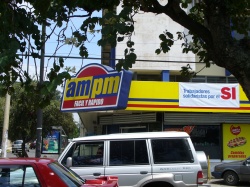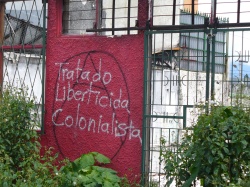Recent story in The Guardian: the Los Angeles Police Department was planning an ethnic enclave map, to identify the regions of LA where there might be terrorism brewing. Problem was, they only were planning to map ethnic Arab enclaves. They’ve been halted on the grounds of racial profiling, and the program is entirely scratched. I’m not a friend of racial profiling, and, I don’t think it advisable for Los Angeles to grow the Angeleno equivalent of Londonistan. The potential incubator of violence is certainly an issue for the UK. Someone was trying to be proactive, no doubt. The question is, why leave out everybody else?
A quick look at the low points in LA History:
Now Los Angeles has a history of racial conflict, and it’s worth reviewing–but neither to revile nor excuse LA.
There were the military v. Hispanic Zoot suit riots of 1941, where a town crammed with servicemen, marginalized Hispanics, and lots of rumors which set of a wave of tit-for-tat murders and consequent riots. Since LA had a swollen population of displaced men from all over the nation (and for many, the first time off the farm and in the bars), a police force that would have been swamped by this event, and a marginalized Hispanic population in a concentrated urban area, you could easily say that conditions were favorable for prolonged violence, regardless of the town.
Lesson No. 1: Displaced people strain the capacity of law enforcement.
Lesson No. 2: Marginalized people don’t buy into the system.
Lesson No. 3: You have to have capacity to be effective.
Then there were the Zebra murder serial killings of 1973-1974, when a splinter faction or subgroup of the Black Muslim movement (actually just plain flat a group of psychopathic killers) went around killing white people as products of some evil genius rather than people in their own right. Police were entirely stumped by the random nature of the killings, and did try some racial profiling in order to sweep through and find the murderers.
Lesson No. 4: Eventually the murderers were caught, and not through racial profiling, but through an informant.
Since 1973 and the consolidation of narcotrafficking routes, the LAPD has been trying to get a handle on the gang wars between the Crips and the Bloods–versus the Latin Kings–versus–the Mexican Mafia, la eMe–starting in 1973 and continuing forward into today.
However, there are so many social indexes involved in this phenomenon, and I will list only a few: it’s more about urban blight and lost opportunity–and the way prison culture is set up, which reinforces, at least with gangs, the racial nature of protection and violence. Not to mention the fabulous profits for narcotics traffic out there, which fuels the economy of gang war.
Lesson No. 5: see Lesson No. 2, marginalized people don’t buy into the system, and add that urban decay creates competition that tends to settle along racial lines at least some of the time–a lot of the time.
Lesson No. 6: If there isn’t a legal economic outlet, then the illegal one will grow up and grow out, and
Lesson No. 7: There will be conflict as the state tries to bring security, or, contain insecurity.
And then, for my last LA example, the brutal handling of Rodney King, whose abusive arrest was filmed. Later, the four police officers that beat him without mercy were cleared in court, which spurred the Rodney King riots of 1992.
Lesson No. 7: To avoid racial conflict, the state has to ensure equal protection and rights under the law.
Back to the Angeleno-Stan Map
From this admittedly punctuated and facile overview, it seems pretty clear that most of these incidents are related to larger social movements: World War II for the Zoot suits; a pathological approach to the resentments underlying the Civil Rights Movement for the Zebra Murders; urban decay and drug traffic; and for the latest incarnation, the Global War on Terror Since 9-11. Unfortunately, no one has ever drawn a Bubba Map for the White Supremacists of Idahoan enclaves (or Kansas City enclaves) or for those pockets of KKK still flourishing in East Texas and outside of Baton Rouge, Louisiana or wherever they might still be. Probably some Bubbas in Los Angeles too, making hate and raising Cain, and with the continued potential for real violence against society at large. In the meantime, Arab-Americans are being racially profiled in Los Angeles and elsewhere. Going through the lessons:
Lesson 1: Displacing people through mapping and targeted enforcement will lead to more, not less, instability.
Lesson 2: Marginalized people (through racial prejudice or lack of economic opportunity, or, both) are more likely to not buy into society. But since one way society has of marginalizing populations is through racial profiling, it’s counterproductive to do it officially.
Lesson 3: The capacity to be effective might include an enclave map, but not one totally focused upon one ethnic group. Like a Bubba map, a psychopath map, etc. But that’s a lot of people to map: why not try something else?
Lesson 4: To get informants, you have to have a relationship. To have a relationship, you have to have someone who believes that the system will take care of him rather than marginalize him.
Lesson 5: Economic revitalization will help people buy into the system and put violence–racist or otherwise–away.
Lesson 6: and help eradicate the violence associated with illegal economies; and
Lesson 7: Equal rights and protection under the law is a necessary component to the long-range goals of law enforcement.
So, mapping Angeleno-stan was never the best approach. Maybe that money could go into mapping better economic revitalization instead, for the good of all races and creeds. It’s a thought.
 Ms. Lalia even mentions one pimp and two madams in her book: the gentleman is named Ben Hogan of Pennsylvania, the “Wickedest Man in the World”; the ladies, “French Kate” (of course, French) but also “Lizzie Toppling”. So you can just imagine what she left out–in particular, the madams of Texas and Oklahoma. I wonder who the wickedest man in Texas was?
Ms. Lalia even mentions one pimp and two madams in her book: the gentleman is named Ben Hogan of Pennsylvania, the “Wickedest Man in the World”; the ladies, “French Kate” (of course, French) but also “Lizzie Toppling”. So you can just imagine what she left out–in particular, the madams of Texas and Oklahoma. I wonder who the wickedest man in Texas was? The
The 

 As far as U.S. language education is concerned, I think I’ve had most of the problems and some of the benefits. One semester out of eight I had a native Spaniard, but Dios, that was high school, ages past; in one university semester I had a very good speaker who had traveled all over the Spanish-speaking world. Two semesters I had the witch from hell, who quite frankly knew little Spanish at all. The poor woman was ninety years old and her feet hurt, so I don’t blame her–much–but on the other hand, she was wasting time . . . . I learned no Spanish from her except how to say “the devil himself”. Hmmm. Wonder why that stuck.
As far as U.S. language education is concerned, I think I’ve had most of the problems and some of the benefits. One semester out of eight I had a native Spaniard, but Dios, that was high school, ages past; in one university semester I had a very good speaker who had traveled all over the Spanish-speaking world. Two semesters I had the witch from hell, who quite frankly knew little Spanish at all. The poor woman was ninety years old and her feet hurt, so I don’t blame her–much–but on the other hand, she was wasting time . . . . I learned no Spanish from her except how to say “the devil himself”. Hmmm. Wonder why that stuck. One great thing about going now is I’ll be able to report some different kinds of news than usual. Some really important issues for my own home state (the U.S., if you haven’t figured it out by now) are obscured by celebrity nonsense, Congressional scandals, next years’ Presidential elections, Iraq, Iran, and Afghanistan.
One great thing about going now is I’ll be able to report some different kinds of news than usual. Some really important issues for my own home state (the U.S., if you haven’t figured it out by now) are obscured by celebrity nonsense, Congressional scandals, next years’ Presidential elections, Iraq, Iran, and Afghanistan.  The best book on effective diplomacy ever. The best book on how to read a report promugated by a government agency, a politician, or a newspaper. The best book on why it is important to be culturally and historically aware. Et cetera:
The best book on effective diplomacy ever. The best book on how to read a report promugated by a government agency, a politician, or a newspaper. The best book on why it is important to be culturally and historically aware. Et cetera: